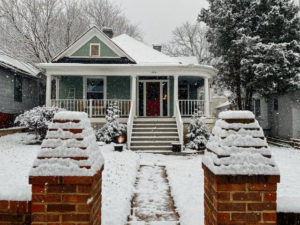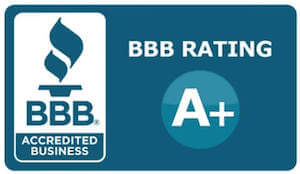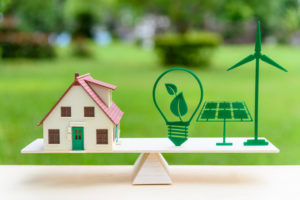
Advanced technologies have made the heat pumps of today far more accessible to everyone because they are able to operate in cold climates. In the past, when the temperatures dropped below freezing, heat pumps stopped being as effective. But now, even people who live in the chilly northern states can enjoy the benefits of a heat pump system.
What are cold climate heat pumps?
First, let’s talk about what a cold climate heat pump system is. Heat pumps work by transferring heat inside from the outdoor air using a heat exchanger, a compressor, and pipes (usually filled with a refrigerant) to transfer heat from one area to another. Heat pump systems don’t need oil or gas to operate. Cold climate heat pumps are heat pump systems designed to work in even sub-zero temperatures. People who live in particularly cold climates often choose a heat pump with a traditional heating system back-up, as this greatly improves energy efficiency and keeps fossil fuel or gas consumption down.
What configurations are they available in?
Call or Click:
Stevensville: (269) 429-9261
Coloma: (269) 468-4321
Ask A Tech
Heat pumps are generally available in two configurations:
- Ductless: Ductless heat pump systems are great for homeowners who are looking to replace a non-ducted heating system, such as baseboard or radiant heat. They also are a good choice to add to rooms like additions or converted areas that may not have access to the home’s ductwork system. They are small and provide great flexibility for zoning or individual spaces.
- Ducted: Ducted heat pumps are a good choice for people looking to replace an old, inefficient furnace system. Ducted heat pumps use the ductwork system in your home to deliver heated air throughout.
What are the main benefits of a cold climate heat pump system?
Learn more about the benefits of installing a ductless or ducted heat pump system in your home:
- Improved Comfort: One of the main benefits of installing a heat pump system is that you’ll not only enjoy more consistent, improved comfort during the winter, but these systems also provide air conditioning in the summer. So, a heat pump system is like getting a heating and cooling system, all in one – and that means better comfort all year long.
- Quiet Operation: Noisy ductwork is a thing of the past when you install a heat pump system. That’s because there is a steady supply of conditioned air being delivered. Not to mention, the indoor and outdoor components of a heat pump system are as quiet as a whisper.
- Energy Savings: According to the Department of Energy, heat pump systems are able to heat and cool your home at a fraction of the cost of oil or propane systems – reducing energy consumption by up to 40 percent in some cases.
- Easy Installation: Unlike systems that would require you to have ductwork added to your home, a heat pump system only requires minimal construction and can be performed by a qualified technician usually within a day (under normal circumstances).
Can Boelcke help me get a heat pump system for my home?
We sure can! When you need heat pumps from a qualified specialist, you can trust Boelcke Heating and Air Conditioning. We can help meet all your home heating needs, large or small. Simply give us a call at (269) 429-9261, and we will be more than happy to assist you.


 If you have an air conditioning system installed in your home, chances are you know that it increases your energy usage. Large equipment like air conditioning uses a great deal of energy. In fact, the Department of Energy indicates that the average household uses about six percent of its annual utility budget on home cooling. What can you do to improve the efficiency of your home’s AC system? The first step is understanding how it uses energy.
If you have an air conditioning system installed in your home, chances are you know that it increases your energy usage. Large equipment like air conditioning uses a great deal of energy. In fact, the Department of Energy indicates that the average household uses about six percent of its annual utility budget on home cooling. What can you do to improve the efficiency of your home’s AC system? The first step is understanding how it uses energy.